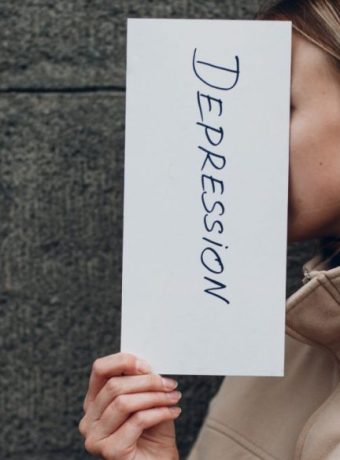Have you ever thought about how to really help a friend or family member with depression? You have more influence than you might know. It all starts with small but caring steps.
Depression is a serious issue that affects millions of people around the world. It might feel overwhelming at first, but you can help. With the right strategy and love, you can make a big difference. This guide will walk you through 10 key steps to help someone with depression find happiness and purpose again.
Key Takeaway
- Recognize the signs of depression.
- Encourage professional help.
- Provide emotional and practical support.
- Promote healthy lifestyle changes.
- Stay alert for warning signs of worsening depression or suicidal thoughts.
What is Depression?
Depression, also known as major depressive disorder, is a mental health condition that affects how a person feels, thinks, and handles daily activities.
It’s more than just feeling sad or having a bad day.
Common Symptoms of Depression
Understanding the symptoms of depression is important for providing support.
Here are some common depression symptoms to watch out for:
- Persistent sad, anxious, or “empty” mood
- Loss of interest or pleasure in hobbies and activities
- Decreased energy or fatigue
- Trouble concentrating, remembering, or making decisions
- Changes in sleep patterns (insomnia or oversleeping)
- Appetite or weight changes
- Feelings of hopelessness, guilt, or worthlessness
- Physical symptoms like headaches or digestive issues without a clear cause
- Thoughts of death or suicide
Causes and Risk Factors
Depression can be caused by a mix of genetic, biochemical, environmental, and psychological factors.
It often runs in families.
Some common causes of depression include life events such as trauma, loss, or ongoing stress.
Understanding depression and its causes can help you better support your loved one.
Stress is a major factor that can worsen depression.
Understanding how stress and anxiety are connected can help manage depression more effectively.
How Depression Affects Daily Life
Depression doesn’t just make you feel down. It also affects how well you can work, talk to people, or do in your everyday life.
The lack of energy and other symptoms can really disrupt your life.
Feeling very sad and tired can prevent you from doing basic things.
It can prevent you from talking to others, working, and caring for yourself.
Some people with depression also have physical issues, making life even harder.
Clinical depression can make life really hard.
It sometimes stops depressed people from enjoying or even doing everyday things.
But, clinical depression is treatable with the right help, like therapy and sometimes medicine.
This helps look at both your feelings and your health.
Effective Treatments for Depression
1. Medications
Antidepressants, such as selective serotonin reuptake inhibitors (SSRIs), are commonly used to treat depression.
They affect brain chemicals and usually take several weeks to show effects.
It’s important for patients to continue their medication even if they don’t see immediate improvements.
2. Psychotherapy
Various forms of psychotherapy have proven effective in treating depression, including cognitive-behavioral therapy (CBT), interpersonal therapy (IPT), and problem-solving therapy.
These therapies help patients change negative thought patterns, improve relationships, and develop coping strategies.
3. Combined Treatment
Combining medication with psychotherapy is often more effective than using either treatment alone, especially for severe or long-term depression.
This approach can lead to greater symptom improvement and better long-term outcomes.
10 Steps to Help Someone with Depression

Step 1: Encourage Professional Help
Encouraging your loved one to seek professional help is an important first step.
This can start with a visit to a primary care doctor, who can rule out other medical conditions and refer them to a mental health professional if needed.
Finding the right therapist can be a turning point in their recovery journey.
Step 2: Provide Emotional Support
Offering unconditional love and support is important.
Be patient and compassionate, as dealing with depression can be challenging for both the person affected and their family members.
Encourage them to talk about their feelings and listen without judgment.
Understanding difficult emotions and providing a safe space for expression can help a lot.
Step 3: Assist with Practical Tasks
Depression often saps energy and motivation, making even simple tasks feel overwhelming.
Help with practical tasks such as making appointments, finding a therapist, and accompanying them to visits.
Organize household chores and suggest specific tasks to make daily life more manageable.
Your assistance can ease some of the burdens they face.
Step 4: Promote Healthy Habits
Encourage your loved one to adopt healthy lifestyle changes.
Regular exercise, a balanced diet, and adequate sleep can positively impact mood and overall well-being.
For more tips on managing stress, check out our article on ways to manage stress.
Step 5: Stay Vigilant for Warning Signs
Be aware of the warning signs of worsening depression or suicidal thoughts.
If your loved one is experiencing depression, thoughts of self-harm, or suicide attempts, seek immediate help from a health care professional.
It’s important to take any mention of suicide seriously and act promptly.
Contact the National Suicide Prevention Lifeline if necessary.
Step 6: Educate Yourself
Learn about depression and its treatments.
The more you understand the condition, the better equipped you’ll be to provide meaningful support to a friend or family member.
Resources like HelpGuide offer valuable insights on various mental health condition topics.
Understanding the symptoms of depression can help you respond more effectively to your loved one’s needs.
Step 7: Foster a Supportive Environment
Create a safe and supportive environment where your loved one feels comfortable expressing their feelings.
Encourage open communication and avoid being critical or dismissive of their experiences.
Providing positive reinforcement can help them feel valued and supported.
Step 8: Encourage Small Goals
Help your loved one set small, achievable goals.
Celebrating these small victories can build their confidence and provide a sense of accomplishment.
Setting and achieving these goals can make a big difference in their recovery process.
Step 9: Be Patient
Recovery from depression can be a slow and challenging process.
Be patient and understanding.
Your consistent support can make a big difference in their journey.
Remember that improvement might not happen overnight, and setbacks are part of the process.
Step 10: Take Care of Yourself
Supporting someone with depression can be emotionally demanding.
Ensure you also take care of your own mental health by seeking support from friends, family, or a counselor.
Your well-being is very important when providing effective support to your loved one.
Additional Steps to Support Someone with Depression
1. Recognize the Impact of Stress
Stress is a major factor that can worsen depressive symptoms.
Encouraging your loved one to manage stress through relaxation techniques, such as meditation or yoga, can help them feel more in control.
Understanding how stress affects the body can provide insights into managing it better.
2. Maintain Regular Communication
Staying in touch regularly can make a big difference.
Whether it’s a phone call, text message, or visit, consistent communication shows that you care and are there for them.
Sometimes, just knowing someone is thinking about them can be comforting.
3. Encourage Participation in Activities
While it may be challenging, encouraging your loved one to participate in activities they once enjoyed can make all the difference.
Even small steps, like a walk in the park or a coffee date, can help improve their mood and provide a sense of normalcy.
4. Avoid Offering Unsolicited Advice
It’s important to listen carefully more than you speak.
Offering unsolicited advice can sometimes feel unhelpful or dismissive.
Instead, ask how you can help and offer support based on their needs and preferences.
5. Create a Safe Space for Expression
Allow your loved one to express their feelings without fear of judgment.
Creating a safe space where they can talk openly about their struggles can be incredibly healing.
Sometimes, just being heard can make a big difference.
6. Be Patient with Treatment
Understand that treatment for depression takes time.
Medications and therapy may not show immediate results.
Encourage your loved one to stay committed to their treatment plan and be supportive during this time.
Recognize that treatment involves managing mental health and physical activity for overall well-being.
7. Recognize Your Limits
Supporting someone with depression is important, but recognizing your limits is equally necessary.
Don’t hesitate to seek professional guidance if you feel overwhelmed.
Taking care of your mental health ensures you can provide the best support possible.
8. Support Groups and Social Support
Encouraging a friend or family member to join support groups can give them a sense of community and understanding.
Support groups, such as those from the Bipolar Support Alliance, offer a safe space to share experiences and find support from others who understand what they are going through.
Social support is a helpful part of managing depression.
9. Encourage Positive Qualities
Remind your loved one of their positive qualities and strengths.
Depression often clouds one’s perception, leading to negative thoughts about themselves.
You can help someone with depression see their worth and value by highlighting their strengths.
10. Addressing Negative Thoughts
Help your loved one identify and challenge negative thoughts.
Cognitive-behavioral techniques can be useful in addressing these thought patterns.
Encourage them to replace negative thoughts with more realistic and positive ones.
12. Dealing with Angry Outbursts
Understand that major depression can sometimes lead to angry outbursts or irritability.
Respond with patience and compassion, and try not to take these outbursts personally.
Encouraging open communication can help manage these emotions more effectively.
13. Participate in Family Therapy
If possible, attend family therapy sessions with your loved one.
Attending family therapy sessions can help improve communication, solve family problems, and understand your loved one’s depression better.
It involves working with a mental health professional to address issues that affect the entire family.
14. Suggest Specific Tasks
Sometimes, someone with depression tends to feel overwhelmed by their daily tasks.
Help them by suggesting specific tasks they can handle, such as organizing household chores or performing small, normal activities that don’t require much effort.
This can make their day feel more manageable and give them a sense of accomplishment.
15. Recognize Suicide Risk
Depression can increase the risk of suicidal thoughts.
If your loved one is severely depressed and talks about suicide, take it seriously.
Encourage them to call the National Suicide Prevention Lifeline or seek help from a mental health professional.
Watch for warning signs such as talking about death, giving away belongings, or expressing feelings of hopelessness.
16. Encourage Seeking Help Early
Encourage your loved one to seek help early if they notice their depression symptoms getting worse.
Early intervention can prevent the condition from worsening and improve the chances of successful treatment.
Conclusion
Helping someone with depression involves a mix of emotional support, practical assistance, and encouraging professional treatment.
By understanding the nature of depression and the available treatments, you can play a vital role in your friend or family member’s recovery journey.
Stay alert for warning signs and encourage participation in activities and support groups to provide a well-rounded support system.
Remember to take care of yourself as well. Supporting someone with depression can be challenging, but your role is important in their journey to recovery.
FAQ
What are some effective active listening techniques?
Nodding and repeating what they tell you shows you understand. Ask questions that don’t have yes-or-no answers. This can help them open up about their feelings.
What should I say or not say to someone with depression?
Say supportive things like, “I’m here for you.” Avoid phrases that belittle their situation, such as, “It’s not so bad.” Your goal is to show you care and respect their feelings.
How can I encourage someone to seek professional help?
Be kind when you suggest counseling. Offer to help with setting up appointments. If they are open to it, join them in a therapy session to offer support.
What are the warning signs of suicide?
Signs someone might be thinking of suicide include talking about not wanting to live, feeling hopeless, and isolating themselves from others. Also, look for giving away belongings and sudden mood changes.
What immediate actions should I take if someone shows signs of suicide?
Promptly get professional help or call the suicide prevention hotline. Stay with the person until help arrives to ensure their safety. This is vital to prevent harm.
How do I use crisis lifelines effectively?
Call the national suicide prevention lifeline or crisis lifeline for immediate support. Be ready to describe the situation so they can offer the best advice and help. They are there to support you.



